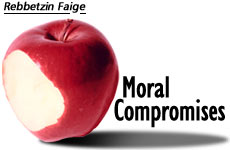 Iran’s Attack on Israel
Iran’s Attack on Israel


3 min read
4 min read
11 min read
5 min read
There is hope, even after making the biggest mistake of one's life.
A reader writes:
I am a 17-year-old girl, and I think I just made the biggest mistake of my life.
For the last year, I have been trying to become more observant and live a more moral life. But I failed and compromised myself, and now I feel terrible. I can't stand to look at myself in a mirror, and I imagine that God can't stand to look at me either. Now that I've done this, I feel that I will be unable to continue to pursue my religious goals, for I cannot take back what I have done, no matter how much I regret it.
Can anything be done? Will God forgive me? Does He see me as a failure too?
Rebbetzin Faige responds:
It is related that the two famous brothers, Reb Elimelech of Lizensk and Reb Zisha, had an enlightening discourse. Reb Elimelech asked his brother how it had come to pass that Adam ate of the forbidden tree in the Garden of Eden.
Tradition informs that all souls of the future were present in the soul of Adam. "If so," Reb Elimelch queried, "how was it that you, Zisha, the holy person that you are, consented to that deed?"
The pious Reb Zisha responded, "I remember exactly where I resided in the person of Adam and I clearly recall that fateful moment. To me, the serpent's enticement was much like the taunt of someone holding a closed fist and saying 'You don't know what I have got in my hand, but it is something unbelievably thrilling and spectacular. Want to have it?' I knew," Reb Zisha concluded, "that indeed the fist would open and reveal nothing but pain and suffering. But as part of Adam, had I insisted on taking the high moral ground, mankind throughout history would have constantly be tortured by the unsettling thought that they had missed some great and tantalizing opportunity. So despite the formidable consequences, I judged it would be better to know beyond any shadow of a doubt that defiance of God's word can only lead to sorrow and tragedy."
Although we were banished from the Garden of Eden and lost our pristine state of being, God did not give up on us.
This was a historic, macrocosmic experience but at some point in all of our lives, each person in their own way chooses to once again test this irrefutable truth. We opt for illusion, fleeting promises of power, pleasure, or blandishments of one kind or another. Ultimately, to our terrible chagrin, we find that the rewards are hollow and bankrupt. We are invariably left with an awful sense of failure and indeed, one of deserving to be banished from paradise, to be distanced from the presence of the Almighty. We are convinced that nothing but rejection must be our fate.
The events following man's first grievous error are most significant and instructive. Although we were banished from the Garden of Eden and lost our pristine state of being, God did not give up on us. Our benevolent Heavenly Parent responded by charting a course through which we could reclaim paradise. He gave us a path by which we could reinstate our integrity. It is one that entails dealing with the consequences, assuming responsibility, and putting forth the requisite hard work.
The greatest pitfall to avoid is self-denigration. Kind David, after his bout with wrongdoing exclaimed, "My transgression is before me and confronts me constantly (Psalms 51,5)." He used his experience to heighten his consciousness and awareness. It helped him identify his vulnerability and hence avert the moral minefields along the journey to recovery and wholeness.
"Mommy, I want to do what I like to do and not what you want me to do!"
My 3-year-old grandson, Yankele, when scolded by his mother for not following her instructions retorted, "Mommy, I want to do what I like to do and not what you want me to do!" Yankele, in his youthful innocence, succinctly captured the essence of the ongoing battle between good and evil in our struggle to make the right choices. During the course of our lives, we become more sophisticated, the props change, and the thresholds differ, but the battle rages until we take our last breath.
I would advise the following practical steps you, my dear reader, to follow:
Remember, above all, that our sages teach that the place occupied by the genuinely repentant soul cannot be accessed even by the most righteous of people. (Talmud Brachot 34b)
In memory of my mother, Gloria Degenstein Philipson - Gittel Chana bas Mordechai
